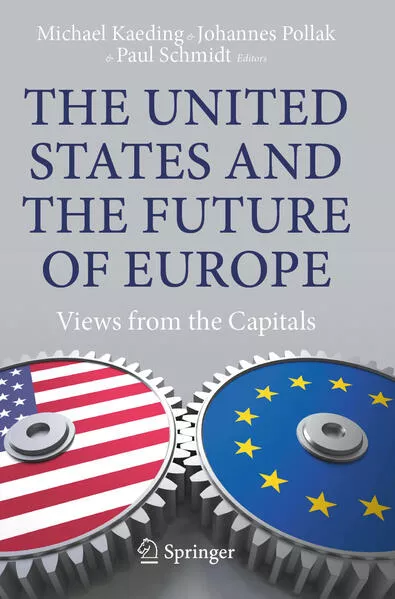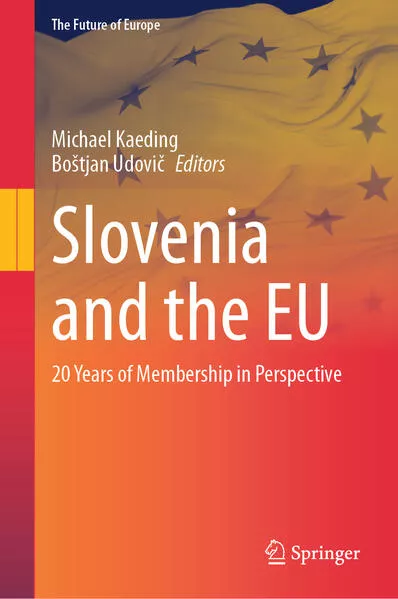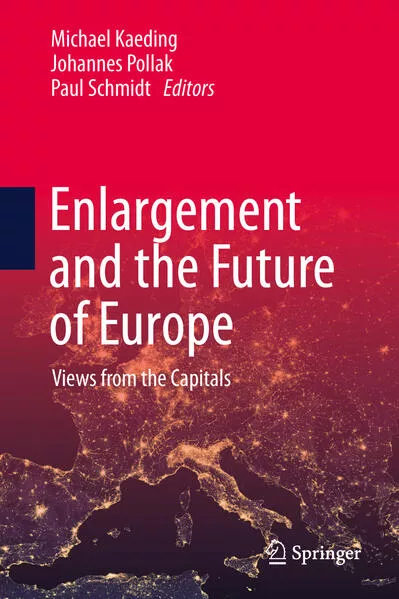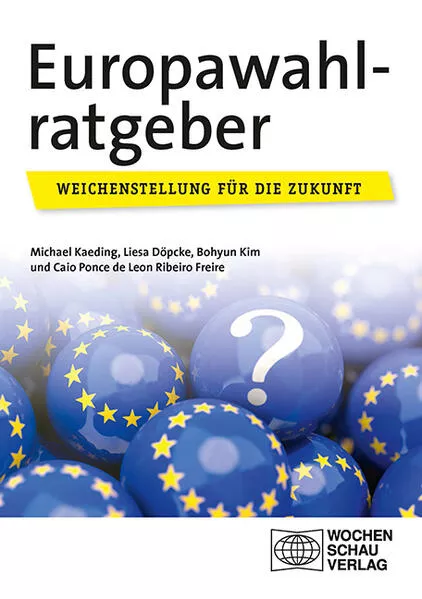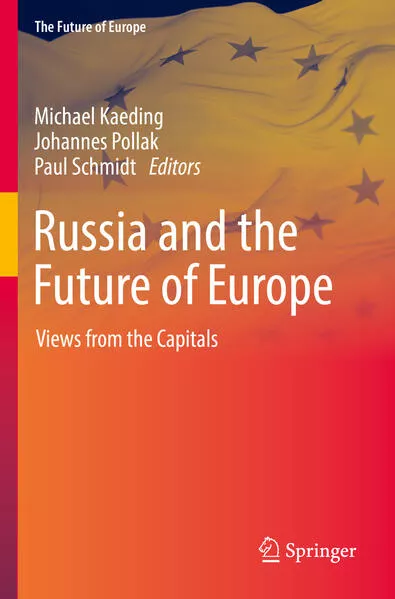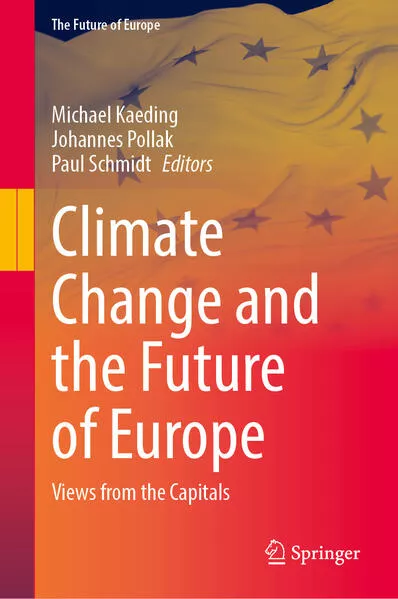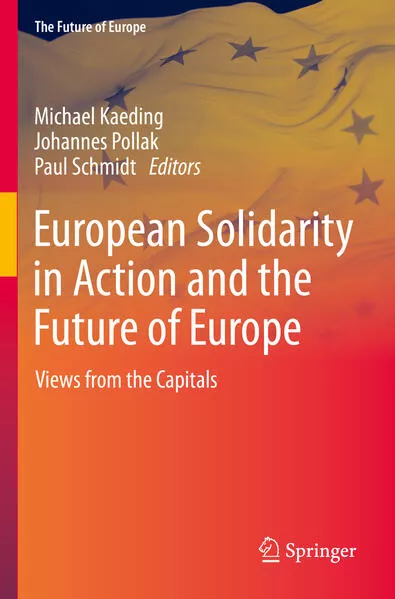
- Publikationen ca: 16
- Fragen & Antworten
Michael Kaeding
Dr. Michael Kaeding is Jean Monnet Professor for European Integration and European Union Politics at the Institute of Political Science of the University of Duisburg-Essen, Germany. He is visiting fellow of the European Institute of Public Administration in Maastricht and member of the flying faculties of the College of Europe, Bruges, and the Turkish-German University in Istanbul. Between 2016 - 2019 he was the chairman of the Trans European Policy Studies Association.
Dr. Johannes Pollak is Professor of International Relations and rector of Webster Vienna Private University, Austria. Prior to this position, he headed the Department for Political Science at the Institute for Advanced Studies in Vienna (on leave). In summer 2019, he was elected chairperson of the Board of the Institute of European Politics in Berlin.
Paul Schmidt is the Secretary General of the Austrian Society for European Politics, which promotes and supports analysis and communication on European affairs. Prior to that he has worked at the Oesterreichische Nationalbank, both in Vienna and at their Representative Office in Brussels at the Permanent Representation of Austria to the European Union.
The United States and the Future of Europe
This book collects 41 national views from EU Member States and neighbouring countries regarding their respective relationship with the United States. It gives evidence of the importance and diversity of transatlantic relations, assesses the potentially disruptive impact of a second Trump presidency and offers policy recommendations.
The United States and the Future of Europe
This book collects 41 national views from EU Member States and neighbouring countries regarding their respective relationship with the United States. It gives evidence of the importance and diversity of transatlantic relations, assesses the potentially disruptive impact of a second Trump presidency and offers policy recommendations.
Slovenia and the EU
This book addresses a range of aspects essential to a better understanding of Slovenia's 20 years in the EU and its exposure to the European integration process, including changes to its policies on e.g. competitiveness, industry, innovation, foreign policy and diplomacy, security and defense, but also its relations to neighboring countries, its experience with European elections, and different forms of Euroscepticism and citizens' trust in EU institutions.
Climate Change and the Future of Europe
While the ambitious objectives outlined in the EU’s Green Deal aim at making Europe the first climate-neutral continent by 2050, national implementation greatly varies depending on local geographies, history, culture, economics, and politics. This book analyses Member States’ and EU neighbours’ national efforts to combat climate change.
Enlargement and the Future of Europe
This book analyses Member States’ and EU neighbours’ national visions for the enlargement of the European Union (EU), highlighting 41 national histories, policies, and corresponding public perceptions of European integration. In a geopolitical context in which Russia’s war of aggression in Ukraine has renewed the impetus for EU enlargement, national views vary considerably on the timing, conditions, and reforms necessary to welcome Eastern neighbours and the Western Balkans countries into the European family.
Enlargement and the Future of Europe
This book analyses Member States’ and EU neighbours’ national visions for the enlargement of the European Union (EU), highlighting 41 national histories, policies, and corresponding public perceptions of European integration. In a geopolitical context in which Russia’s war of aggression in Ukraine has renewed the impetus for EU enlargement, national views vary considerably on the timing, conditions, and reforms necessary to welcome Eastern neighbours and the Western Balkans countries into the European family.
Europawahlratgeber
Die Wahl des Europäischen Parlaments entscheidet darüber, wie in Zukunft drängende Probleme wie Inflation, Energiekrise, Migration oder Klima gelöst werden. Durch die Teilnahme an den Europawahlen können die Bürger der 27 Mitgliedsstaaten ihre politische Meinung zum Ausdruck bringen, denn: wer wählt, kann Einfluss auf die zukünftige Gestaltung der EU nehmen.
Europawahlratgeber
Die Wahl des Europäischen Parlaments entscheidet darüber, wie in Zukunft drängende Probleme wie Inflation, Energiekrise, Migration oder Klima gelöst werden. Durch die Teilnahme an den Europawahlen können die Bürger der 27 Mitgliedsstaaten ihre politische Meinung zum Ausdruck bringen, denn: wer wählt, kann Einfluss auf die zukünftige Gestaltung der EU nehmen.
Russia and the Future of Europe
This book sheds light on how Member States and EU neighbours relate to Russia. It includes their historical, financial and political ties, as well as the public perception of the national population vis-à-vis Russia. Each chapter builds on these factors to elucidate the country’s position towards Russia and provides a prediction on the future of these relations.
Climate Change and the Future of Europe
While the ambitious objectives outlined in the EU’s Green Deal aim at making Europe the first climate-neutral continent by 2050, national implementation greatly varies depending on local geographies, history, culture, economics, and politics. This book analyses Member States’ and EU neighbours’ national efforts to combat climate change.
Climate Change and the Future of Europe
While the ambitious objectives outlined in the EU’s Green Deal aim at making Europe the first climate-neutral continent by 2050, national implementation greatly varies depending on local geographies, history, culture, economics, and politics. This book analyses Member States’ and EU neighbours’ national efforts to combat climate change.
European Solidarity in Action and the Future of Europe
This book sheds light on how member states and EU neighbours reacted to the COVID-19 pandemic through the lens of European solidarity, what they expect from the EU, and other member states, and how they are ready to contribute to common action. The volume reveals how European countries experience and perceive solidarity from the EU and towards the EU in different policy dimensions, such as intra-EU mobility, healthcare and financial and economic aspects of Europe’s recovery.
Russia and the Future of Europe
This book sheds light on how Member States and EU neighbours relate to Russia. It includes their historical, financial and political ties, as well as the public perception of the national population vis-à-vis Russia. Each chapter builds on these factors to elucidate the country’s position towards Russia and provides a prediction on the future of these relations.
Russia and the Future of Europe
This book sheds light on how Member States and EU neighbours relate to Russia. It includes their historical, financial and political ties, as well as the public perception of the national population vis-à-vis Russia. Each chapter builds on these factors to elucidate the country’s position towards Russia and provides a prediction on the future of these relations.
European Solidarity in Action and the Future of Europe
This book sheds light on how member states and EU neighbours reacted to the COVID-19 pandemic through the lens of European solidarity, what they expect from the EU, and other member states, and how they are ready to contribute to common action. The volume reveals how European countries experience and perceive solidarity from the EU and towards the EU in different policy dimensions, such as intra-EU mobility, healthcare and financial and economic aspects of Europe’s recovery.
European Solidarity in Action and the Future of Europe
This book sheds light on how member states and EU neighbours reacted to the COVID-19 pandemic through the lens of European solidarity, what they expect from the EU, and other member states, and how they are ready to contribute to common action. The volume reveals how European countries experience and perceive solidarity from the EU and towards the EU in different policy dimensions, such as intra-EU mobility, healthcare and financial and economic aspects of Europe’s recovery.
